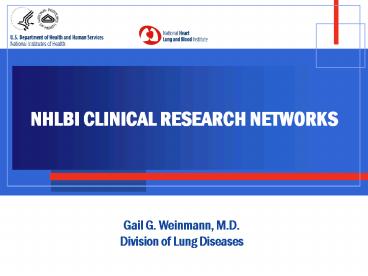NHLBI CLINICAL RESEARCH NETWORKS - PowerPoint PPT Presentation
1 / 14
Title:
NHLBI CLINICAL RESEARCH NETWORKS
Description:
Peer Review. 4. 8. Council. Finalize Protocol, DSMB, etc. 12. 16. Council. NIH Guide. Funding ... Protocol Review Committee. Data and Safety Monitoring Board ... – PowerPoint PPT presentation
Number of Views:60
Avg rating:3.0/5.0
Title: NHLBI CLINICAL RESEARCH NETWORKS
1
NHLBI CLINICAL RESEARCH NETWORKS
- Gail G. Weinmann, M.D.
- Division of Lung Diseases
2
NHLBI Approach to Clinical Research
- Investigator initiated single clinical study
(R01) - - Single center
- - Multi-center
- Institute initiated
- Multi-center, single clinical trials (RFP/RFA)
- Multiple single-center trials (RFP/RFA)
- Bench-to-bedside collaboration (SCCOR)
- Clinical research networks (RFA/RFP)
3
What is a Clinical Research Network?
Flexible Mechanism that includes
- Multiple clinical centers
- One data coordinating center
- Agreement to collaborate in the development and
conduct of multiple intervention protocols over 5
years
4
Why Clinical Networks?
- Networks fill a gap
- Address important management questions and
clinical topics most relevant to clinical
practice - Able to rapidly address multiple, related
questions - Networks are efficient
- Share resources (expertise, infrastructure, data
analyses, results dissemination) - Allow recruitment of adequate patient numbers,
especially for uncommon conditions - Allow rapid development and conduct of multiple
protocols - Rapid discoveries contribute to future protocols
- Provide critical mass and development of skills
in clinical research
5
Protocol Concept to Implementation
NHLBI / Investigator Initiated (R01)
Finalize Protocol, DSMB, etc.
Council
Submit R01
Peer Review
Funding
Protocol Starts (?)
NIH Guide
Council
BEE
12
16
0
4
8
9
-7
Months
Time Saved
ACRN Network
7 Months
PRC Approval
SC Concept Review
Protocol Starts
PRC Review
DSMB Review
12
9
4
8
0
Months
6
Key Components of a Clinical Research Network
Sponsor NHLBI Program Division
Data and Safety Monitoring Board
Protocol Review Committee
Steering Committee
Clinical Centers Collaborators
Data Coordinating Center
7
Role of Steering Committee
- Main governing body for network
- Establish subcommittees (e.g. P P, Q/C, etc)
- Identify topics for study
- Set priorities
- Design, implement and interpret all studies
- Publish findings
- Assure compliance with network policiesand
procedures
8
Protocol Development/Selection
Protocol Review Committee
DSMB Oversight
Intra-Center Proposal
Steering Committee
Protocol Implementation Conduct
Protocol Working Group
9
Selected Elements for Establishing A Clinical
Network
- Multi-center studies to assure access to
sufficient pts. - Multiple clinical research questions exist and
could be addressed - Resources available for multiple protocols
- Availability of well trained clinical
investigators - Availability of Institute staff to assure high
quality management
10
NHLBI Clinical Research Networks
Adult Asthma
Acute Respiratory Distress Syndrome
Childhood Asthma
Thalassemia
Pediatric Heart Disease
Blood and Marrow Transplant
Transfusion Medicine Hemostasis
COPD
Resuscitation Outcomes Consortium
Pulmonary Fibrosis
Sickle Cell Disease
Heart Failure
Cardiovascular Cell Therapy
Cardiothoracic Surgical Investigations
CVRN in Community Based Care
AsthmaNet
11
DLD Networks in the 21st Century Workshop (May
2007)
- Recommendations
- maintain the focus on improving clinical care but
allow more research question flexibility - develop mechanisms to facilitate and promote
scientific exchange across clinical research
programs - structure networks to maximize efficiency
- promote shared use of resources and
standardization among networks - promote training
- facilitate rapid dissemination of research
findings
12
- Letter of Intent December 30, 2008
- Application Receipt Date January 30, 2009
http//grants.nih.gov/grants/guide/rfa-files/RFA-H
L-08-010.html
http//grants.nih.gov/grants/guide/rfa-files/RFA-H
L-08-011.html
13
New AsthmaNet Research Objectives
- Clinical management questions across all ages
- Proof of concept or mechanistic studies
- Dissemination of research findings collaboration
with NHLBI's Division of Applied Research
Discoveries - Harmonize and standardize phenotyping,
procedures, data elements, outcomes for use
across programs - Establish links with other NIH resources (GCRC,
CTSAs) - Training collaborations across centers
14
Ideas for CTSA-Network collaboration
- Augment existing resources
- - recruitment infrastructure
- space, equipment for clinical studies
- - statistical and analytic support for
secondary papers - Complement existing resources
- Provide missing expertise (Regulatory experience,
research ethics, standardization, harmonization) - Training of investigators
- Community interaction (research participation,
diffusion of results, effectiveness research) - Promote scientific exchange intra- and intercenter































